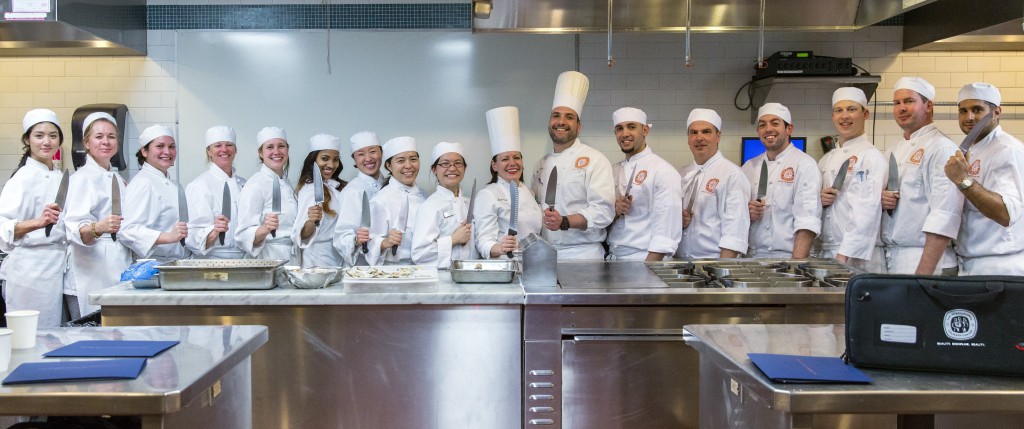Corby Kummer, august senior editor for the Atlantic and one of my all-time idols, thinks my writing is shit.
Fine, he didn’t say it exactly like that.
Kummer was teaching a weeklong writing workshop, and everyone had submitted second drafts of essays on food. One by one, he whisked us into the hallway for individual conferences, then periodically returned to give comments to the entire group. All day, I had a nagging feeling that something was wrong. Why wasn’t my piece being read out loud to the class? Why was it at the bottom of the pile?
Wendy was one of the lucky ones. Her first paper was so perfect that her “revision” was to write another paper.
For the second paper, Kummer told her that he had no comments. It was perfect, again.
I congratulated her on her double win. Then I went back to doing what I do best—worrying while looking happy about it.
Bells tolled. My afternoon stupor was interrupted by Emily’s shoulder tap. “Hey Crystal, he wants to see you.”
In the vending machine alcove, Kummer was marking papers with a vengeance. I glanced at mine, lying on top of a trash can. It looked oddly clean and blank.
“You’re an expert writer, but you’re too self-conscious.”
Kummer looked at me, eyes framed under a furry blanket of hair. He continued.
“I read some of these lines and think, ‘Would you say that in speech?’
“Take this part, where you talk about dropping a lobster into boiling water: ‘The sucker will thrash and create a lively ruckus.’
“It’s like you’re detached and having these self-conscious remarks. You’re so incredibly aware of what you’re doing that it’s distracting. You just sound…Writerly. With a capital W.”
Did I mention that Kummer rejected me for a writing fellowship at the Atlantic three months ago?
I needed to defend myself.
“When you tell me to use monosyllabic words, I feel like it strips away my writing. Maybe I like using long words in daily conversation!”
Kummer gave me a skeptical look. “Shall we go through this piece from the beginning?”
I nodded. I needed to pee.
“You have moments that flow. This part about adding ‘fistfuls of julienned scallions, ginger and garlic’ is nice. Oh, and I can’t believe I missed this the first time—‘Atop a clinical ad seeking sperm donors, I gently placed the cutting board’– that is such a lovely detail.
“This reference to Hades, I just don’t think you would say that in speech. Did you really mean to say that?”
I twitched on the inside.
“Maybe I’ve been reading too much Jane Grigson [a writer who uses lots of classical references]. I don’t know, I was working on this at 6 am.”
“Oh my.”
“Well, it was better than writing it post-party.”
Kummer gave me a look. I am not sure if it was sympathetic or admonishing.
He went on. “Are you familiar with David Szanto? He had the same problem.”
David is a writer who taught at the beginning of the year. He is also a former student at the university, and my go-to advisor for all matters related to writing.
“David used to say, ‘I can write this piece with 3 different tones. What would you like to see? ’
“I guess I want to see you develop a consistent voice. What do you sound like?”
I looked at Kummer and stammered, “Don’t you see? I feel incredible pressure to write whatever you want me to write.”
“But that’s exactly it, I want to hear you.”
I started to cry. God, I hate when I do that.
“What if I am a pretentious person who loves high-falutin language?” I asked.
“You would call yourself a pretentious person?”
“Do you see the shirt that I’m wearing?” I waved at my body. “It says, ‘Bad grammar makes me [sic].’ If you called me pretentious, I would not be offended.”
Kummer’s face wrinkled with a smirk.
“You know, back when I was younger, people called me pretentious too. So I can relate.
“Writers have a way of hiding behind a façade, and you can’t really get to know them. It’s like they have something to protect. They want you to see a certain aspect of themselves, or maybe they’re too embarrassed to show their true selves.
“I want to see who you really are.
“This line—‘stop being a pussy and just kill the damn thing.’ I think that’s you. That’s who I want to hear.
“Now, I really wish I could read more of your writing. I’m curious about what your voice really is. After working with David for a week, I think he really nailed it down.”
He handed me a blue tissue. I wiped my nose less than gracefully.
“You know what, David thinks my writing is great.”
“Of course, I’m not surprised,” Kummer replied.
“I am sorry that I have made you upset.”
I waved him off between sniffles. “No no, it’s all right, I really appreciate your honesty.”
“Okay fine, then I’m not sorry that I made you upset.
“I am being so harsh because I want you to go to that next level.
“I spent half my time copyediting the rest of the class’ papers. In terms of copyediting, this is flawless.
“You’re an excellent writer—you’ve made yourself into one—and you’re ambitious.”
Maybe he was making that up entirely.
I bet he hates that I used the word “august” to describe him in line one.
I don’t care.


